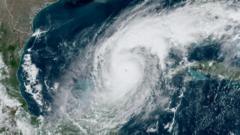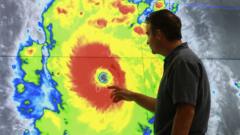**Meteorologists express relief as the Department of Defense delays data withdrawal, but concerns about longer-term access persist.**
**Temporary Reinstatement of Satellite Data for Hurricane Forecasts Extended Through July**

**Temporary Reinstatement of Satellite Data for Hurricane Forecasts Extended Through July**
**Government backs down on cancellation, ensuring vital data remains available for storm tracking.**
The U.S. Department of Defense (DoD) announced an unexpected extension of critical satellite data availability for hurricane forecasting, now continuing until July 31. This change follows a prior decision to cease access by June 30, which alarmed meteorologists and climate researchers reliant on this information.
Initially, the National Oceanic and Atmospheric Administration (NOAA) had proposed to end data services from vital satellites related to hurricane observation, citing "recent service changes" as the reason for this abruptly altered framework. The DoD subsequently clarified that a “significant cybersecurity risk” was the impetus for the potential data removal, which has raised further questions regarding the management of sensitive information.
The decision to keep this crucial data flowing came after NASA scientists pressed for its retention, landing a response that relieved many in the climate science community. Meteorologist Michael Lowry remarked on the surprising nature of the DoD’s initial plan, noting that while the month extension provides a temporary assurance, it does not suffice for the peak months of hurricane season—August, September, and October—when the likelihood of hurricanes increases dramatically.
Beyond impacting hurricane tracking, the cancellation of these satellite services could jeopardize other important climate research areas. For instance, scientists monitoring polar sea ice—a critical component in tracking global climate change—would feel significant repercussions, as explained by Sharon Stammerjohn from the University of Colorado Boulder. The loss of these data records would hinder the ability to observe essential changes in the Arctic and Antarctic ice levels, which have profound implications for our understanding of climate dynamics.
Although other international satellite services may partially fill the void, experts highlight challenges in data consistency and accuracy, calling into question the effectiveness of substitutive sources.
As the situation unfolds, the balance between national security concerns and the imperative need for reliable climate monitoring remains a crucial focus for officials and scientists alike.
Initially, the National Oceanic and Atmospheric Administration (NOAA) had proposed to end data services from vital satellites related to hurricane observation, citing "recent service changes" as the reason for this abruptly altered framework. The DoD subsequently clarified that a “significant cybersecurity risk” was the impetus for the potential data removal, which has raised further questions regarding the management of sensitive information.
The decision to keep this crucial data flowing came after NASA scientists pressed for its retention, landing a response that relieved many in the climate science community. Meteorologist Michael Lowry remarked on the surprising nature of the DoD’s initial plan, noting that while the month extension provides a temporary assurance, it does not suffice for the peak months of hurricane season—August, September, and October—when the likelihood of hurricanes increases dramatically.
Beyond impacting hurricane tracking, the cancellation of these satellite services could jeopardize other important climate research areas. For instance, scientists monitoring polar sea ice—a critical component in tracking global climate change—would feel significant repercussions, as explained by Sharon Stammerjohn from the University of Colorado Boulder. The loss of these data records would hinder the ability to observe essential changes in the Arctic and Antarctic ice levels, which have profound implications for our understanding of climate dynamics.
Although other international satellite services may partially fill the void, experts highlight challenges in data consistency and accuracy, calling into question the effectiveness of substitutive sources.
As the situation unfolds, the balance between national security concerns and the imperative need for reliable climate monitoring remains a crucial focus for officials and scientists alike.





















